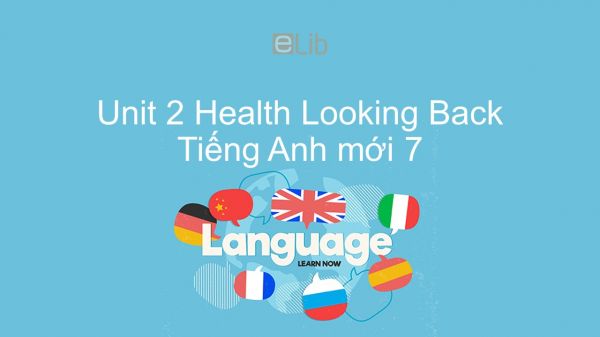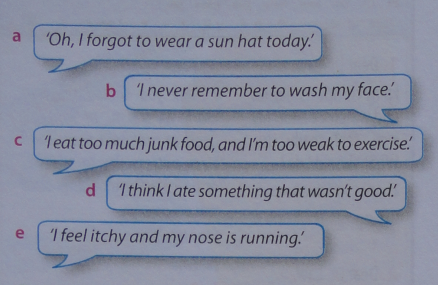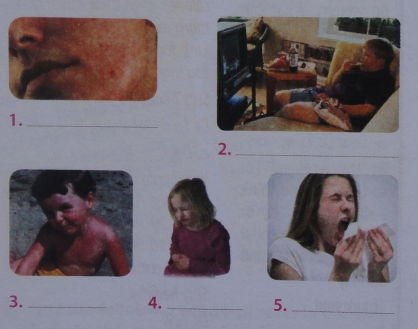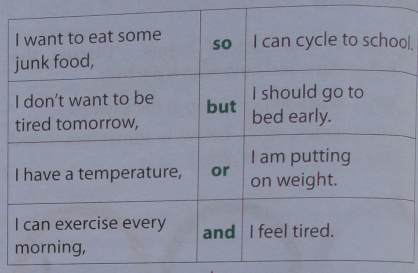Unit 2 lớp 7: Health - Looking Back
Bài học Unit 2 lớp 7 mới phần Looking Back giúp các em ôn tập từ vựng và các điểm ngữ pháp cơ bản có trong trong bài học. Thông qua nhiều dạng bài tập khác nhau, các em có cái nhìn sâu sắc hơn về chủ đề "Sức khỏe". Mời các em cùng tham khảo!
Mục lục nội dung

1. Vocabulary
1.1. Task 1 Unit 2 lớp 7
What health problems do you think each of these people has? (Em nghĩ mỗi người này gặp vấn đề nào?)

Guide to answer
a. He/ she has the sunburn. (Anh ấy/cô ấy bị cháy nắng.)
b. He/ she has the spots. (Anh ấy / cô ấy bị vết dơ.)
c. He/ she puts on weight. (Anh ấy / cô ấy tăng cân.)
d. He/ she has a stomachache. (Anh ấy/cô ấy bị đau bụng.)
e. He/ she has flu. (Anh ấy/ cô ấy bị cảm cúm.)
1.2. Task 2 Unit 2 lớp 7
Look at the pictures below. Write the health problem below each person (Nhìn vào những bức hình bên dưới. Viết vấn đề sức khỏe bên dưới mỗi người.)

Guide to answer
1. spots (mụn)
3. sunburn (cháy nắng)
2. putting on weight (tăng cân)
4. stomachache (đau bụng)
5. flu (cúm)
2. Grammar
2.1. Task 3 Unit 2 lớp 7
Complete the health tips below with 'more' or 'less' (Hoàn thành những bí quyết sức khỏe bên dưới.)
Guide to answer
1. Eat less junk food. It makes you fat!
(Ăn ít thức ăn vặt lại. Nó làm bạn mập đấy!)
2. Wash your hands more. You will have less chance of catching flu.
(Rửa tay nhiều hơn. Bạn sẽ có ít cơ hội bị bệnh cúm hơn)
3. Sleep more, but try to wake up at the usual time. Even at weekends!
(Ngủ nhiều hơn, nhưng cố gắng dậy vào thời gian như thường lệ. Thậm chí là vào cuối tuần!)
4. Go outside less. If you do need to go outside, wear a sun hat.
(Đi ra ngoài ít hơn. Nếu bạn cần đi ra ngoài, nên đội nón.)
5. Watch less television. Looking at the screen for too long hurts your eyes.
(Xem ti vi ít hơn. Nhìn màn hình quá lâu sẽ gây hại cho mắt.)
6. Do more exercise, and you will feel fitter and healthier.
(Luyện tập thể thao nhiều hơn, và bạn sẽ cảm thấy cân đôi hơn và khỏe mạnh hơn.)
2.2. Task 4 Unit 2 lớp 7
Draw a line to link the sentences and a coordinator to form meaningful sentences (Viết một dòng để liên kết các câu và một từ bổ nghĩa để hình thành câu ý nghĩa.)

Guide to answer
1. I want to eat some junk food, but I am putting on weight.
(Tôi muốn ăn thức ăn vặt nhưng tôi đang lên cân.)
2. I don’t want to be tired tomorrow, so I should go to bed early.
(Tôi không muốn mệt mỏi vào ngày mai, vì thế tôi sẽ đi ngủ sớm.)
3. I have a temperature, and I feel tired.
(Tôi bị sốt và tôi cảm thấy mệt.)
4. I can exercise every morning, or I can cycle to school.
(Tôi có thể luyện tập mỗi buổi sáng, hoặc tối có thể đạp xe đến trường.)
3. Communication
3.1. Task 5 Unit 2 lớp 7
Choose one of the following health problems. Role-play a discussion. Student A is the patient. Student B is the doctor (Chọn một trong những vấn đề sức khỏe sau. Đóng vai một cuộc thảo luận. Học sinh A là một bệnh nhân. Học sinh B là một bác sĩ.)

Example:
A: Hi doctor, I feel weak and sick.
B: Did you have enough calories? You should eat more and I think you should get more exercise too.
A: OK. Thank you doctor.
Tạm dịch:
A: Chào bác sĩ, tôi bị yếu và đau.
B: Bạn có đủ calo không? Bạn nên ăn nhiều hơn và tôi nghĩ bạn cũng nên tập thể dục nhiều hơn.
A: Vâng. Cảm ơn bác sĩ.
Guide to answer
1. have sunburn
A: Hi doctor. Oh my face is so red. I was outside yesterday.
B: You have the sunburn. You should drink much water and put the yogurt on your skin.
A: I will. Thank you.
2. have toothache
A: Doctor, oh, my teeth are so hurtful. I feel very uncomfortable.
B: I think you have the toothache. Let me check your teeth more carefully and I will give you the medicine.
A: Thanks a lot.
3. putting on weight
A: Oh, doctor, I’m so scared. Fm putting on weight. I ate so much.
B: You should eat less and do exercise more.
A: Thanks doctor, I will do.
4. have an allergy
A: I ate seafood yesterday. I feel uncomfortable. My skin is so itchy.
B: I think you have an allergy. You should take the medicine.
A: Thanks doctor.
5. have a cough and a runny nose
A: Oh, doctor, I have a cough and a runny nose. I feel so bad.
B: You have the flu. You should drink orange juice, take the medicine and take a sleep.
A: Thanks Doctor.
Tạm dịch
1. cháy nắng
A: Chào bác sĩ. Ồ mặt tôi thật là đỏ. Tôi đã ở ngoài vào hôm qua.
B: Bạn bị cháy nắng rồi đấy. Bạn nên uống nhiều nước và đắp sữa chua lên da.
A: Tôi sẽ làm thế. Cảm ơn bác sĩ.
2. đau răng
A: Bác sĩ, ôi, răng tôi đau quá. Tôi cảm thấy khó chịu vô cùng.
B: Tôi nghĩ bạn bị đau răng rồi đấy. Để tôi kiểm tra răng bạn kỹ hơn và tôi sẽ cho bạn thuốc uống.
A: Cảm ơn bác sĩ nhiều.
3. tăng cân
A: Ồ bác sĩ, tôi sợ quá. Tôi đang lên cân. Tôi đã ăn quá nhiều.
B: Bạn nên ăn ít hơn và tập luyện thề thao nhiều hơn.
A: Cảm ơn bác sĩ, tôi sẽ làm thế.
4. bị dị ứng
A: Tôi đã ăn hải sản hôm qua. Tôi cảm thấy không khỏe. Da tôi ngứa ngáy.
B: Tôi nghĩ bạn bị dị ứng. Bạn nên uống thuốc.
A: Cảm ơn bác sĩ.
5. ho và chảy nước mũi
A: Ồ, bác sĩ, tôi bị ho và chảy nước mũi.
B: Bạn bị cảm rồi đó. Bạn nên uống nước cam, uống thuốc và đi ngủ.
A: Cảm ơn bác sĩ.
3.2. Task 6 Unit 2 lớp 7
Discuss the following sentences about health with a partner. Do you think they are facts or myths? (Thảo luận những câu sau về sức khỏe với một bạn học. Em có nghĩ nó Là sự thật hay là hoang đường?)
Example:
When you have a headache, you should rub an egg on your head. (Khi bạn bị đau đầu, bạn nên xoa một quả trứng lên đầu)
A: I don’t think this is true. It’s a myth. (Tôi không nghĩ diều nàu đúng. Nó là chuyện hoang đường)
B: Yes, I agree. /No, I disagree. I heard it’s true. (Vâng, tôi đồng ý/ Không tôi không đồng ý. Tôi nghe điều này đúng)
1. Going outside with wet hair gives you a cold or flu.
2. Eating more fresh fish makes you smarter.
3. Eating more carrots helps you see at night.
Guide to answer
1. When you go outside with wet hair, it can make you get a cold or flu. (Khi bạn ra ngoài với cái mũ ẩm ướt sẽ khiến bạn bị cảm lạnh hoặc cảm cúm)
A: I think it's true (Tôi nghĩ điều này đúng)
B: Yes, I agree (Vâng tôi đồng ý)
2. You should eat more fresh fish, it can make you smarter. (Bạn nên ăn nhiều cá tươi, điều này giúp bạn thông minh hơn)
A: I don’t think this is true. (Tôi không nghĩ điều này đúng)
B: Yes, I agree. (Vâng tôi đồng ý)
3. You should eat more carrots, it will help you see in the night more clearly. (Bạn nên ăn nhiều cà rốt, điều này giúp bạn nhìn trong đêm tối rõ hơn)
A: I think this is true. (Tôi nghĩ điều này đúng)
B: No, I don't agree. (Không tôi không đồng ý.)
4. Practice Task 1
Choose the best answer (Chọn đáp án đúng nhất)
A. Calories are units of energy. They refer to the amount of energy you get from foods and drinks, and the amount of energy you use through physical activities. For example, an apple has about 80 calories, while a 1.6 km walk might use up 100 calories. Calories are important for human health, and the key is having the right amount of it.
B. Everyone needs different amounts of energy per day depending on age, size and activity levels. An athlete needs more calories than an office worker. To stay in shape, an average adult requires at least 1,800 calories per day (according to the Food and Agriculture Organization of the United Nations). If we eat just the number of calories our body needs each day, we will probably be healthy. However, eating too much can make you put on weight. To lose weight, eat fewer calories than your body burns each day.
C. These are some experts' tips to reduce calorie intake. First, you must know how many calories you need each day and always count them in your diet. Have small frequent meals and drink more water too. This will help you feel less hungry. Furthermore, avoid all sugary drinks and junk food. They are high in energy but low in nutritional value.
Question 1: What are calories?
A. They are units of energy.
B. They are the amount of energy.
C. They are important.
D. Each person needs different amounts of calories.
Question 2: How many calories does an apple contain?
A. 100 calories B. About 80 calories
C. About 160 calories D. None are correct.
Question 3: What factor decides the amount of energy a person needs each day?
A. Age B. Size C. Activity levels D. All are correct.
Question 4: What is a healthy number of calories per day?
A. At least 160 calories B. About 80 calories
C. At least 1,800 D. None are correct.
Question 5: What happens when we eat too many calories?
A. We can put on weight B. We will be healthy.
C. We can lose weight. D. We can reduce calorie intake.
5. Practice Task 2
Rearrange the words to make a sentence (Sắp xếp các từ để được một câu)
Question 1: I / have / toothache / so / I / have to / see / dentist.
A. I have a toothache so I have to see dentist.
B. I have toothache so I have to see dentist.
C. I have a toothache so I have to see the dentist.
D. I have toothaches so I have to see the dentists.
Question 2: Watch / much / TV / not / good / your eyes.
A. Watch much TV is not good for your eyes.
B. Watching much TV is not good for your eyes.
C. Watch too much TV is not good for your eyes.
D. Watching too much TV is not good for your eyes.
Question 3: When/ I/ ten/ begin/ play football.
A. When I was ten, I began to play football.
B. When I was ten, I begin to play football.
C. When I am ten, I began to play football.
D. When I was ten, I began play football.
Question 4: Calories / important / human / health.
A. Calories are important for human health.
B. Calories is important for human health.
C. Calories are important with human health.
D. Calories is important with human health
Tạm dịch:
1. Khi bạn đi ra ngoài với tóc ướt, nó có thể làm bạn bị cảm.
A: Vâng, tôi đồng ý.
2. Bạn nên ăn nhiều cá tươi hơn, nó có thể làm cho bạn thông minh hơn
A: Vâng, tôi đồng ý.
B: Tôi không nghĩ điều này đúng.
3. Bạn nên ăn cà rốt nhiều hơn, nó sẽ giúp bạn thấy trong bóng tối rõ hơn.
A: Vâng, tôi đồng ý.
B: Tôi không nghĩ điều này đúng.
6. Conclusion
Kết thúc bài học này, các em cần ghi nhớ hai điểm ngữ pháp quan trọng trong bài: Câu mệnh lệnh với more và less và Câu ghép; đồng thời trau dồi thêm vốn từ vựng bằng cách ghi nhớ các từ bên dưới:
- sunburn /ˈsʌnbɜːn/ cháy nắng
- spot /spɒt/ mụn nhọt
- stomachache /ˈstʌməkeɪk/ đau dạ dày, đau bụng
- flu /fluː/ cảm cúm
- toothache /ˈtuːθeɪk/ đau răng
- cough /kɒf/ ho
- runny nose /ˈrʌni/ /nəʊz/ chảy nước mũi, ngạt mũi
- allergy /ˈælədʒi/ dị ứng
